Praise for The Soul of an Octopus
Has science ever been this deliciously hallucinatory? Boneless and beautiful, the characters here are not only big-hearted, theyre multi-hearted, as well as smart, charming, affectionate... and, of course, ambidextrous. If there is a Mother Nature, her name is Sy Montgomery.
Vicki Constantine Croke, author of the New York Times bestseller Elephant Company
In this beautifully written book, she brings empathy, insight, and an enchanting sense of wonderment to the bonds we inherently share with other beingseven those seeming far different from us.
Vint Virga, DVM, The Soul of All Living Creatures
Surely there are large differences among nonhuman animals and between nonhuman and human animals, but there also are many basic similarities. If you have trouble imagining a very smart and deeply emotional octopus, substitute dog for octopus and read on, but keep in mind that it is octopus about whom Ms. Montgomery is writing. Connecting with other animals is part of the essential and personal process of rewilding and reconnecting with other animals, and The Soul of an Octopus is just what is needed to close the gap.
Marc Bekoff, author of The Emotional Lives of Animals, Why Dogs Hump and Bees Get Depressed, and Rewilding Our Hearts: Building Pathways of Compassion and Coexistence
Can an octopus have a mind and emotions, let alone a soul? Sy Montgomery faces these questions head-on in her engaging new book as she explores the world of octopuses, making friends with several and finding heartbreak when they die. They arent, she discovers, simply brainless invertebrates but personable, playful, conscious beings. Montgomerys enthusiasm for animals most of us rarely see is infectious, and readers will come away with a new appreciation for what it means to be an octopus.
Virginia Morell, author of Animal Wise: How We Know Animals Think and Feel
Other Books by Sy Montgomery
FOR ADULTS
Birdology
The Good Good Pig: The Extraordinary Life of Christopher Hogwood
Search for the Golden Moon Bear: Science and Adventure in Pursuit of a New Species
Journey of the Pink Dolphins: An Amazon Quest
The Curious Naturalist: Natures Everyday Mysteries
The Wild Out Your Window
Spell of the Tiger: The Man-Eaters of Sundarbans
Walking with the Great Apes: Jane Goodall, Dian Fossey, Birut Galdikas
FOR CHILDREN
The Octopus Scientists
Chasing Cheetahs
The Tapir Scientist
Temple Grandin: How the Girl Who Loved Cows Embraced Autism and Changed the World
Saving the Ghost of the Mountain
Kakapo Rescue
Quest for the Tree Kangaroo
The Tarantula Scientist
Search for the Golden Moon Bear: Science and Adventure in the Asian Tropics
Encantado: Pink Dolphin of the Amazon
The Man-Eating Tigers of Sundarbans
The Snake Scientist
First published in Great Britain by Simon & Schuster UK Ltd, 2015
A CBS COMPANY
Copyright 2015 by Sy Montgomery
This book is copyright under the Berne Convention.
No reproduction without permission.
All rights reserved.
The right of Sy Montgomery to be identified as the author of this work has been asserted by her in accordance with sections 77 and 78 of the Copyright, Designs and Patents Act, 1988.
Simon & Schuster UK Ltd
1st Floor
222 Grays Inn Road
London WC1X 8HB
www.simonandschuster.co.uk
Simon & Schuster Australia, Sydney
Simon & Schuster India, New Delhi
A CIP catalogue copy for this book is available from the British Library.
ISBN: 978-1-4711-4938-2
eBook ISBN: 978-1-4711-4939-9
Interior design by Paul Dippolito
Printed and bound by CPI Group (UK) Ltd, Croydon, CR0 4YY
For Anna
Yesterday remains perfect

CHAPTER ONE

Athena
Encountering the Mind of a Mollusk
O n a rare, warm day in mid-March, when the snow was melting into mud in New Hampshire, I traveled to Boston, where everyone was strolling along the harbor or sitting on benches licking ice cream cones. But I quit the blessed sunlight for the moist, dim sanctuary of the New England Aquarium. I had a date with a giant Pacific octopus.
I knew little about octopusesnot even that the scientifically correct plural is not octopi, as I had always believed (it turns out you cant put a Latin endingion a word derived from Greek, such as octopus). But what I did know intrigued me. Here is an animal with venom like a snake, a beak like a parrot, and ink like an old-fashioned pen. It can weigh as much as a man and stretch as long as a car, yet it can pour its baggy, boneless body through an opening the size of an orange. It can change color and shape. It can taste with its skin. Most fascinating of all, I had read that octopuses are smart. This bore out what scant experience I had already had; like many who visit octopuses in public aquariums, Ive often had the feeling that the octopus I was watching was watching me back, with an interest as keen as my own.
How could that be? Its hard to find an animal more unlike a human than an octopus. Their bodies arent organized like ours. We go: head, body, limbs. They go: body, head, limbs. Their mouths are in their armpitsor, if you prefer to liken their arms to our lower, instead of upper, extremities, between their legs. They breathe water. Their appendages are covered with dexterous, grasping suckers, a structure for which no mammal has an equivalent.
And not only are octopuses on the opposite side of the great vertebral divide that separates the backboned creatures such as mammals, birds, reptiles, amphibians, and fish from everything else; they are classed within the invertebrates as mollusks, as are slugs and snails and clams, animals that are not particularly renowned for their intellect. Clams dont even have brains.
More than half a billion years ago, the lineage that would lead to octopuses and the one leading to humans separated. Was it possible, I wondered, to reach another mind on the other side of that divide?
Octopuses represent the great mystery of the Other. They seem completely alien, and yet their worldthe oceancomprises far more of the Earth (70 percent of its surface area; more than 90 percent of its habitable space) than does land. Most animals on this planet live in the ocean. And most of them are invertebrates.
I wanted to meet the octopus. I wanted to touch an alternate reality. I wanted to explore a different kind of consciousness, if such a thing exists. What is it like to be an octopus? Is it anything like being a human? Is it even possible to know?
So when the aquariums director of public relations met me in the lobby and offered to introduce me to Athena, the octopus, I felt like a privileged visitor to another world. But what I began to discover that day was my own sweet blue planeta world breathtakingly alien, startling, and wondrous; a place where, after half a century of life on this earth, much of it as a naturalist, I would at last feel fully at home.


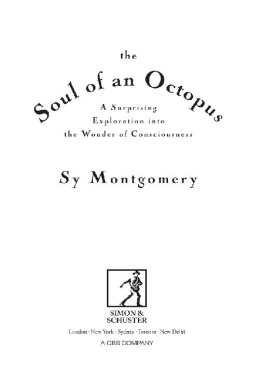
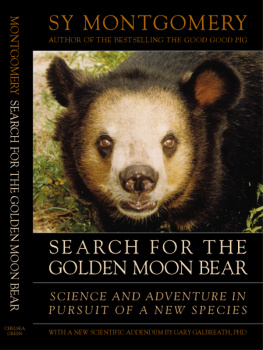
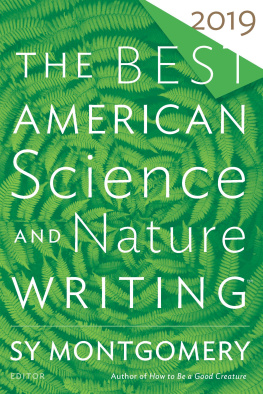
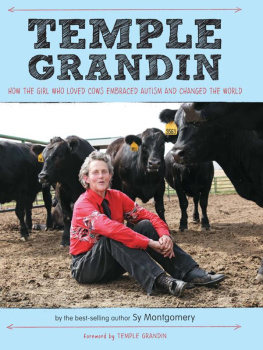
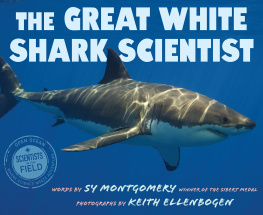
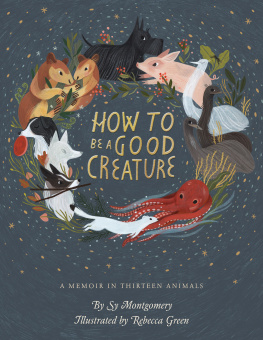
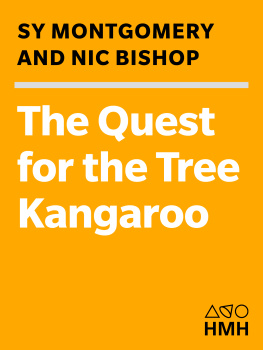
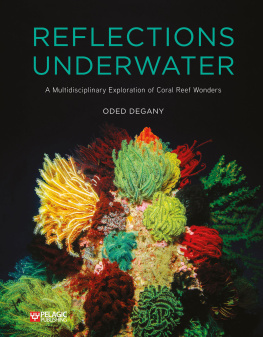
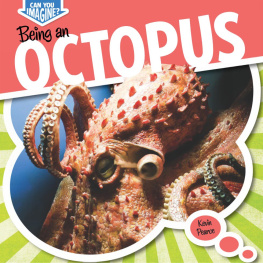

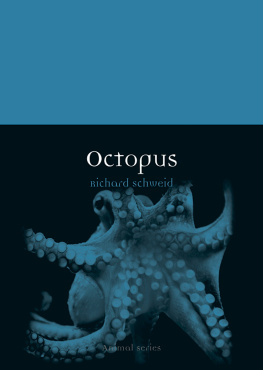
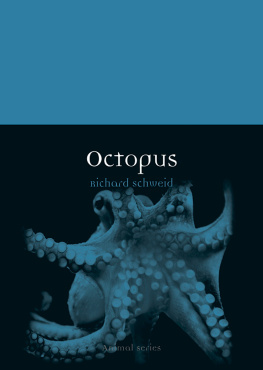
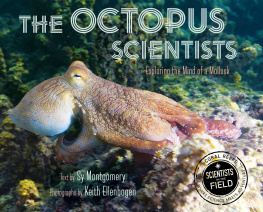
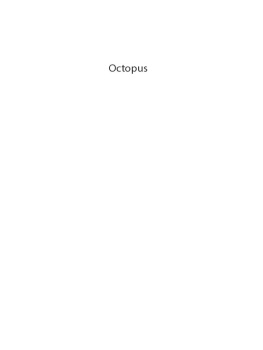
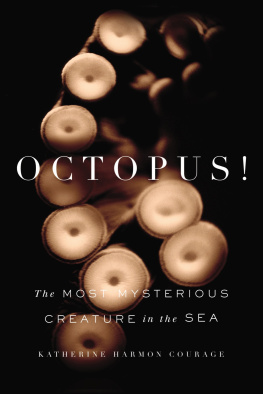

 CHAPTER ONE
CHAPTER ONE 
